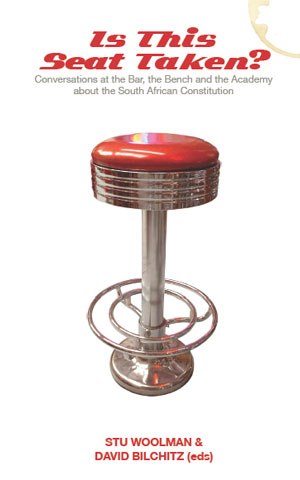Is This Seat Taken? Conversations at the Bar, the Bench and the Academy about the South African Constitution
Edited by Stu Woolman and David Bilchitz
2012
ISBN: 978-0-920538-07-1
Pages: vii 446
Print version: Available
Electronic version: Free PDF available
About the publication
Now that economic development is starting to pick up in many countries in Africa, the question arises how such development can be balanced with the need for adequate environmental protection. This crucial issue, inherent in the notion of sustainable development, is addressed in this innovative and path-breaking volume. For the first time, academics from seventeen African countries have joined forces to analyse the way in which economic and environmental interests are balanced in their legal systems. The authors all use a common framework to improve the comparability of the country studies. The different country-related chapters do not only provide insights into the formally applicable legal rules (law in the books)., but given that the book brings together academics aware of the practice in Africa, they also describe the way in which environmental policy functions in practice (law in action). Many case studies, with conceptual analyses are provided of pollution incidents and the way in which administrative agencies or courts have on those occasions balanced the interests between the economy, society and the environment. A critical comparative analysis by the editors points at tendencies towards convergence and points of divergence between the African countries. Suggestions for policy reform are also formulated, showing African countries how they can benefit from experiences in the US and Europe.
This thought provoking volume is a must for anyone (academic, policymaker or practitioner) interested in sustainable development generally and in Africa in particular.
About the editors:
Stu Woolman is the Academic Director at the South Africa Institute for Advanced Constitutional, Public, Human Rights and International Law.
David Bilchitz is Professor at the University of Johannesburg and Director of the South African Institute for Advanced Constitutional, Public, Human Rights and International Law (SAIFAC).
Table of Contents
Preface
Chapters
- 1. Rationality is dead! Long live rationality! Saving rational basis review
Michael Bishop - 2. The content and justification of rationality review
Alistair Price - 3. Taking diversity seriously: Religious associations and work-related discrimination
Patrick Lenta - 4. On the fragility of associational life: A constitutive liberal’s response to Patrick Lenta
Stu Woolman - 5. Migration, street democracy and expatriate voting rights
Wessel le Roux - 6. Constitutional patriotism or constitutional nationalism? A response to Wessel le Roux
Karin van Marle - 7. Does transformative constitutionalism require the recognition of animal rights?
David Bilchitz - 8. Animal rights and the interpretation of the South African Constitution
Thaddeus Metz - 9. Is there a difference that makes a difference between ubuntu and dignity?
Drucilla Cornell - 10. Where dignity ends and ubuntu begins: An amplification of, as well as an identification of a tension in, Drucilla Cornell’s thoughts
Yvonne Mokgoro and Stu Woolman - 11. Balancing and the limitation of rights in the South African Constitution
Iain Currie - 12. Does balancing adequately capture the nature of rights?
David Bilchitz - 13. Towards a framework for understanding constitutional deference
Kirsty Mclean - 14. Reclaiming the frontier of constitutional deference: Mazibuko v City of Johannesburg – a jurisprudential setback
Redson Edward Kapindu - 15. On the common saying ‘what’s true in golf is true in law’: The relationship between theory and practice across forms of life
Stu Woolman - 16. Theory, practice and the legal enterprise
David Bilchitz and Juha Tuovinen - 17. Between charity and clarity: Kibitzing with Frank Michelman on how to best read the Constitutional Court
Stu Woolman - 18. Old Kibitzes never die: A rejoinder to Stu Woolman
Frank I Michelman - 19. Judicious transparency
Jonathan Klaaren
20. In search of a theory of judicious (judicial) transparency: A response to Klaaren
Richard Calland and Chris Oxtoby
